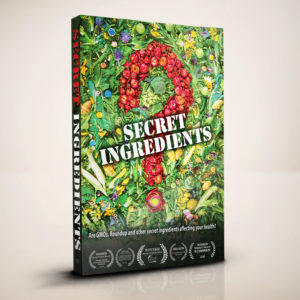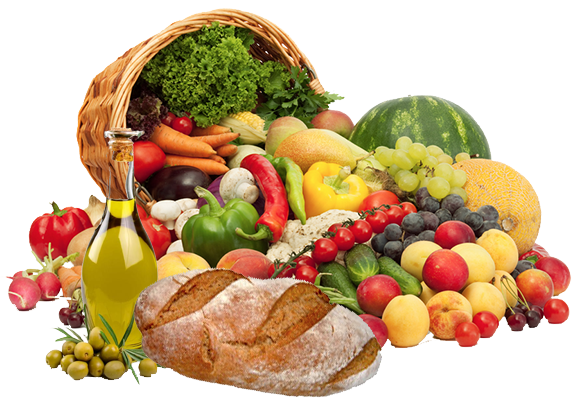The Story
While the debate rages on about GMOs and pesticides, a new, powerful, award winning, documentary film by Amy Hart and Jeffrey Smith, shares remarkable stories of people who regain their health after discovering the secret ingredients of GMO’s, herbicides and pesticides in their food and making a bold commitment to avoid them.
The ingredients in our food may be a lead driver of obesity, infertility, cancer, digestive problems, autism, brain fog, skin conditions, gluten sensitivity, allergies, fatigue, anxiety, and many other conditions.
Meet more than a dozen people whose turned around serious health conditions after adopting a diet that avoids genetically modified organisms (GMOs) and food sprayed with toxic herbicides like Roundup. Learn from leading physicians who say that these are not coincidences. They see illness and recovery like this every day in their practice. And listen to the scientists who explain why.

Reviews
Customer Reviews
In an effort to provide the best shopper experience Organic Circle is giving our customers an opportunity to share their experiences with going organic. How have you benefited going organic? If you are feeding your family organic, are your kids healthier, more energetic, sharp minded, and resistant to infections? We want to hear from you. To that end we are offering a small perk in the form of savings to any customer submitting a review, or contributing to our blog.
Simply sign up for a store card if you don’t yet have one and enjoy some really nice savings and not to mention some extra shopping points.
Submit Your comments below:
Awesome Health
 Can You Put A Price Tag on Health?
Can You Put A Price Tag on Health?
There are few things that outweigh excellent physical health. You have only one body during your entire lifetime. Would you maintain it any less than the most expensive car on Earth. Those who own expensive cars’ such as a Roll’s Royce, or Bentley etc. spare no costs when it comes to maintaining and keeping the car running in top working condition. Take an expensive winning race horse as another example: Would you go cheap on the feed or care given to it? Of course not!
What price tag can you place on excellent physical health? And of course what does excellent physical health look like?
- Amazingly high energy levels!
- Clear mind and sharp thinking
- Excellent memory – short and long term!
- Resistance to cold’s, viruses and bacteria
- Good, smooth healthy skin..
- Youthful appearance and vibrant hair!
- Strong bones and teeth…
- Healthy weight, and waist size
- Good cardiovascular health
- Excellent blood pressure
- Plus much more…
Of course vitamins, minerals and supplements of various kinds all promote health and many of the above benefits. There is no question that when that when they are taken in the right amounts and doses they are extremely valuable. Most vitamins and nutritional supplements, improve many aspects of health. It can be said that all these help to extend both your life and the quality of your life.
It is almost impossible to put a price tag on good health.
But, that is especially true for the food you eat. You see, the food you eat directly impacts the quality of your life. How? The answer is clear to even the greatest skeptics. Food that is pure as can be and as free as possible of artificial preservatives, ingredients, additives and flavorings can be consumed in greater quantities and still promote good health. The purer and more wholesome the food you consume, the better off your body will run.
This is not about a debate on whether toxic herbicides and pesticides are safe for the environment or harmful to consume. In the day and age we live in, chemicals are found in nearly every supermarket food typically consumed.
On the other hand: “Organic” as defined by the Department Of Agriculture or U.S.D.A. indicates that food with the ORGANIC label is grown and packaged as naturally as can be with special care taken to keep it free artificial additives and chemicals.
You don’t have to wait years to experience the benefits or going organic. Going organic with 90-95% of the food you eat, yields benefits in immediate health and energy levels that you can experience and enjoy in days! That is not to mention weeks and months and…years ahead as well.
However, it can be said that even the most minor improvement in your general health and longevity is well worth the investment you make today even if it is modest.
Consider it an investment in good health, worth every penny, dime and dollar.
Your body too, will thank you for it.
In an effort to provide the best shopper experience Organic Circle is giving our customers an opportunity to share their experiences with going organic. How have you benefited going organic? If you are feeding your family organic, are your kids healthier, more energetic, sharp minded, and resistant to infections? We want to hear from you. To that end we are offering a small perk in the form of savings to any customer submitting a review, or contributing to our blog.
Simply sign up for a store card if you don’t yet have one and enjoy some really nice savings and not to mention some extra shopping points.
Why Organic
Naturally Green, Organically Clean: The Benefits of Going Organic
Walk into almost any supermarket and as your browse the aisles you will more than likely come across several sections labeled “Organic.” These displays may be larger in some stores and smaller in others, but if you are anything like me, you have probably found yourself wondering what benefits if any organic foods offer and are they really worth the extra cost?






